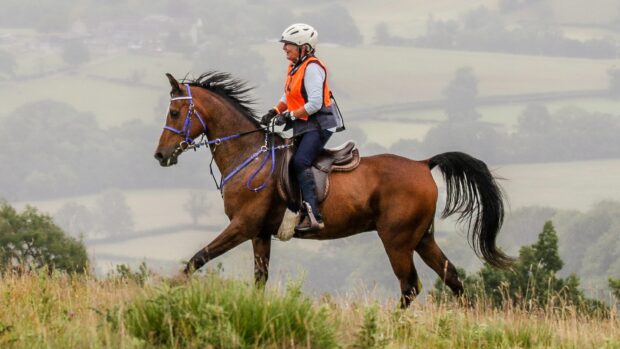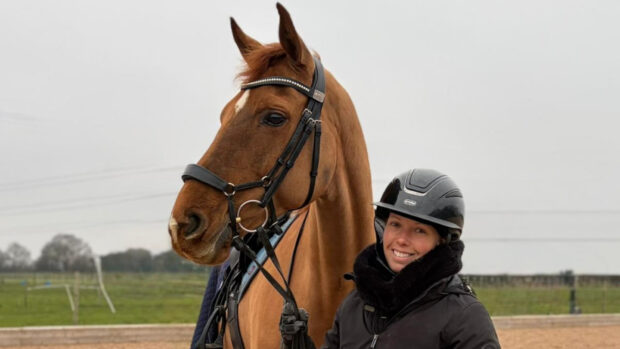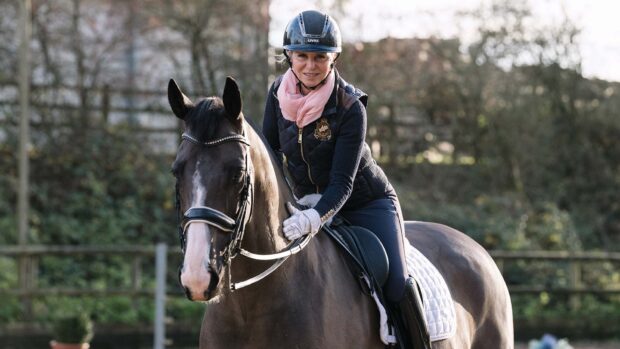An equestrian who was diagnosed with stage three breast cancer aged 27 says she is almost grateful for the illness, as it has transformed her own life, and allowed her to help others.
Sarah Stephens’ diagnosis came “completely out of the blue” in 2016, when she thought she had just become established on the course her life was supposed to take. Five years on, she has delivered some 500 sessions of equine therapy to other people affected by cancer.
She told H&H the idea for her Macmillan Spirit and Soul Equine Therapy Service, in Derbyshire, came from her own experiences since May 2016.
“I went to the doctor as I’d found a random lump and initially it was all ‘Don’t worry, it’s highly unlikely it’s anything’,” Sarah said. “I went back for my results and it was stage three breast cancer; within 15-20 minutes, everything changed.”
Sarah underwent six months of chemotherapy to shrink the tumours, then a double mastectomy, and an operation to remove her ovaries, as genetic testing had revealed a fault on a BRCA one gene that meant developing ovarian cancer was more likely.
At that stage, Sarah had two horses: former racehorse Trevor and miniature Shetland Foxy, as the hobby she worked to afford.
“My friends at the yard did them for me the night I was diagnosed as I was stuck in hospital,” she said. “But the next morning, I went down to see them. They were in the barn and I was sitting there with the ex-racehorse’s head in my lap. I must have sat there for two hours, and it gave me some time to process everything.
“The horses became a huge part of everything; they were a focus. I can count on one hand the days I didn’t do them through my treatment, because they gave me a purpose.”
Sarah said the horses were also a respite in other ways.
“People don’t know what to say to you in that situation; some people couldn’t even look at me once I’d lost my hair, and my boobs,” she said. “But the horses still treated me like me.
“The Shetland is a notorious mini Shetland and the other one was a stubborn character; don’t feel sorry for yourself, just get on with it. I needed that, and I started thinking ‘There’s something to this’.”
Sarah had been working in psychology in prisons, to help people make changes, and she started making plans for the service; taking a notebook with her to her chemotherapy sessions, to use the three-hour treatment periods to plan for the future.
“It gave me something to look forward to,” she said. “A lot of what we do now, I make sure is really focused on solutions, and looking to the future, even to those people whose condition is terminal; you’ve still got life, let’s live it.”
As soon as her treatment was over, and the cancer gone, Sarah set up her service. In summer 2017, she contacted Macmillan Cancer Support, to see if the charity was interested in being involved.
“I thought they could only say no; when you’ve just gone through all that, you take a few more risks!” she said. “At the time, we were at a lovely farm but in a dilapidated old cabin with no electricity. The Macmillan partnership manager came out in her high heels and I made her a cup of tea on the camping stove, and thought she’d laugh. But she loved it.”
The service provides one-to-one sessions — “There are so many support groups, but this is bespoke; people’s journeys are so individual,” Sarah said — with individual or herds of horses.
Each client has four sessions funded by Macmillan; they might involve grooming the horses or working with them from the ground.
“Horsey people can brush off grooming, thinking it’s just grooming, but it can be quite grounding,” Sarah said. “One lady took the brush and as soon as she put it on the horse, she burst into tears. She just stopped for a second and her brave face came off.
“You get so fixated on the next treatment or what’s going to happen, and you’ve got no control over any of it, but this allows you to be mindful, and just focus on the now.”
Sarah said the horses respond differently to each person, and that although some may struggle at first; even if they say they are coping, the horses can sense the inner turmoil, by the last sessions, the horses have become almost friends.
“The feedback has been amazing,” Sarah said. “It’s still so incredible to hear; the little snippets, from people saying they feel themselves again, for the first time in however long, or have felt they had hope again.”
Sarah mentioned one woman, who died last year, and whose family asked for donations to the service rather than funeral flowers, as it had made such a significant impact on her life. The service has now expanded, to be run also from Healing With Horses in Widnes.
“I had a phone call from a member of her family the other day, saying emotionally, we’d kept her alive as long as we did,” Sarah said.
“It all feels a bit surreal. I had a Facebook memory pop up the other day from five years ago, when I was in chemotherapy, and everything has completely changed since then.
“The ridiculous thing is that I’m incredibly grateful for being so ill, because without it, my life would be completely different. And other people’s too.”
You might also be interested in:
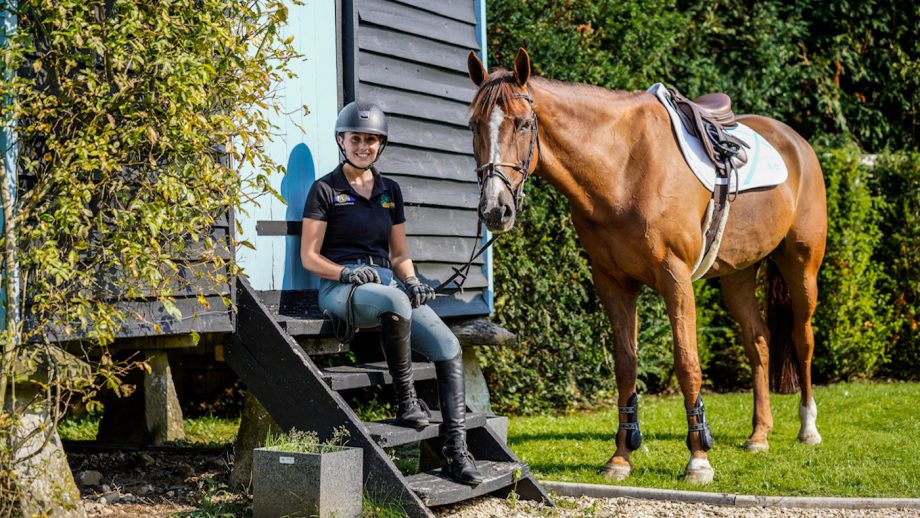
Showjumper who underwent double mastectomy hopes her story may help save lives
“I still look like I’ve got breasts, with my airbags; it’s really clever”
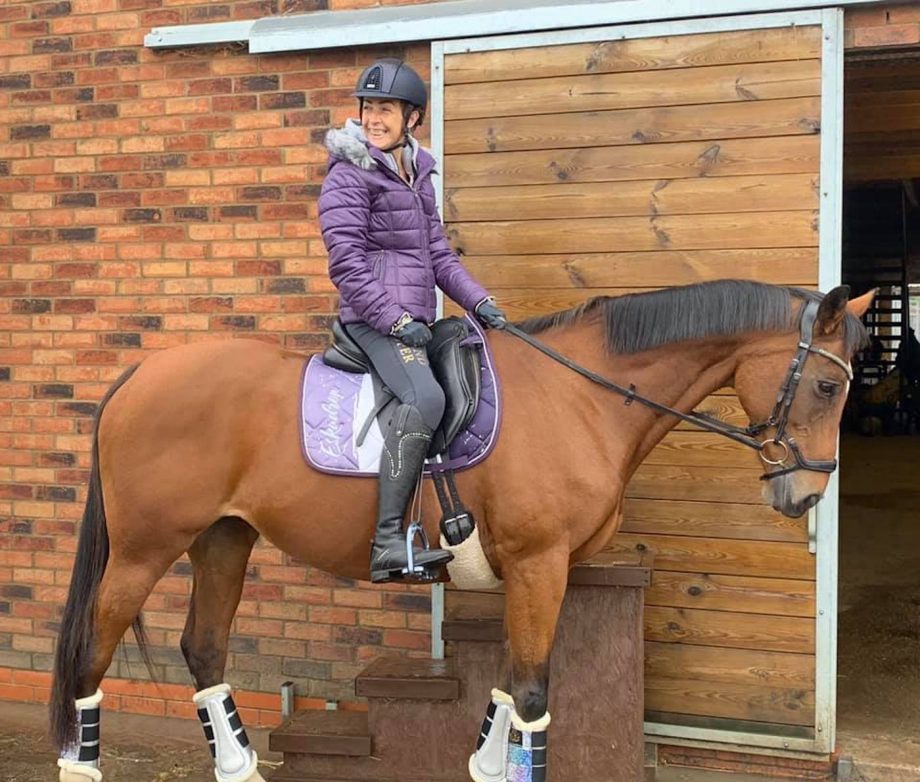
‘This can’t be the end for me’: rider defies cancer and life-changing surgery to take on eventing challenge
‘As soon as my bottom hit that saddle, I cried, because I felt like me again. I’d been in a

Subscribe to Horse & Hound magazine today – and enjoy unlimited website access all year round
Horse & Hound magazine, out every Thursday, is packed with all the latest news and reports, as well as interviews, specials, nostalgia, vet and training advice. Find how you can enjoy the magazine delivered to your door every week, plus options to upgrade your subscription to access our online service that brings you breaking news and reports as well as other benefits.


